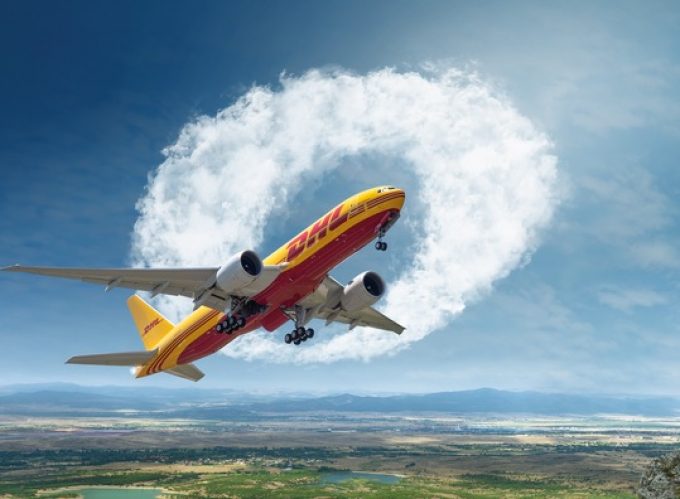Asia Pacific driving an express market set to keep delivering healthy growth
The global parcel delivery market has boasted steady growth since 2020, with Asia the largest ...
PLD: REBOUND MATTERSAMZN: MULTI-BILLION LONG-TERM MEXICO INVESTMENTDSV: WEAKENING TO TWO-MONTH LOWSKNIN: ANOTHER LOW PG: STABLE YIELDAAPL: GAUGING EXPECTATIONSXOM: GO GREEN NOWKNIN: BOUNCING OFF NEW LOWS HON: BREAK-UP PRESSURECHRW: UPGRADESZIM: LAGGARDFWRD: LEADINGMAERSK: OPPORTUNISTIC UPGRADETSLA: GETTING OUTDSV: DOWN BELOW KEY LEVELLINE: DOWN TO ALL-TIME LOWS
PLD: REBOUND MATTERSAMZN: MULTI-BILLION LONG-TERM MEXICO INVESTMENTDSV: WEAKENING TO TWO-MONTH LOWSKNIN: ANOTHER LOW PG: STABLE YIELDAAPL: GAUGING EXPECTATIONSXOM: GO GREEN NOWKNIN: BOUNCING OFF NEW LOWS HON: BREAK-UP PRESSURECHRW: UPGRADESZIM: LAGGARDFWRD: LEADINGMAERSK: OPPORTUNISTIC UPGRADETSLA: GETTING OUTDSV: DOWN BELOW KEY LEVELLINE: DOWN TO ALL-TIME LOWS

PRESS RELEASE
DHL Express with pioneering collaborations on the use of sustainable aviation fuels (SAF): bp and Neste deliver over 800 million litres of SAF
Bonn, March 21, 2022: DHL Express has announced an important step towards increased decarbonization of aviation logistics and greater sustainability. In this context, DHL confirmed new strategic partnerships with bp and Neste. The two companies will supply DHL Express with more than 800 million liters of sustainable aviation fuel (SAF) over the next five years. The agreement represents one of the largest SAF deals in the history of aviation to date. In combination with the previously announced introduction of the innovative new fuel in the DHL network at San Francisco (SFO), East Midlands (EMA) and Amsterdam (AMS) airports, this will achieve 50 percent of DHL Express’ goal of meeting ten percent of air freight’s fuel demand with sustainable fuels by 2026. The logistics service provider expects that the strategic cooperation will save around two million tonnes of carbon dioxide emissions over the entire life cycle of the aviation fuel – this corresponds to the annual carbon dioxide emissions of around 400,000 passenger cars[1].
DHL Express transports more than 480 million urgent documents and shipments per year in its global network, which includes 220 countries and territories. Put simply, the approximately 1,000 DHL flights that are handled annually between Cincinnati in the USA and the Leipzig hub with Boeing 777 aircraft could be operated entirely with the agreed 800 million liters of bio-kerosene for a period of twelve years[2] – assuming a 100 percent use of sustainable aviation turbine fuel[3]. This corresponds to a total of 12,000 CO2-neutral long-haul flights.
“As the world’s leading logistics service provider, we are committed to offering our customers environmentally friendly and sustainable solutions. The groundbreaking SAF agreements with bp and Neste are a significant step for the aviation industry and once again underline the goals of our sustainability roadmap,” says Frank Appel, CEO Deutsche Post DHL Group. “The use of sustainable aviation fuels is currently one of the most important levers in aviation to reduce CO2 emissions with the currently available aircraft types over the entire life cycle.”
“We are proud of the significant partnership that further deepens our strategic relationship with Deutsche Post DHL Group. As bp transforms into an integrated energy company, we leverage our entire value chain, which includes raw materials, global production, logistics and airport infrastructure. Not many companies also have the commercial and business know-how in SAF needed to develop and deliver solutions to complex customer needs,” said Martin Thomsen, SVP, Air bp. “Our goal is to work even more closely with airports and airlines on decarbonization options, and we strongly promote SAF to help global aviation realize its ambitions to reduce carbon emissions.”
In its sustainability roadmap, Deutsche Post DHL Group has committed to using more than 30 percent SAF admixtures in its air freight business by 2030. Both producers supply sustainable aviation turbine fuels made from used cooking oil. By using SAF derived from waste products and residues, greenhouse gas emissions over the life cycle can be reduced by up to 80 percent compared to fossil kerosene, thus reducing DHL’s CO2 footprint. To ensure that the fuel is actually sustainable, the use of raw materials that compete with food production or indirectly change land use is avoided.
“With each SAF business, we are becoming increasingly aware of the enormous tasks ahead of us to support our customers with sustainable solutions. Practically every day, customers ask us for CO2-neutral logistics solutions and support in jointly shaping a more sustainable future,” says John Pearson, CEO DHL Express. “The new SAF agreements with bp and Neste are a milestone on this path. Our primary focus is on getting more SAF suppliers to close the current supply gap. At the same time, we call on policymakers to create the right framework conditions for accelerating the market introduction of SAF in the European Union and around the world.”
“Our most comprehensive cooperation in the field of SAF to date sets the course and underlines the increasing need and urgency – as well as the required commitment – to tackle aviation-related emissions. We are delighted to be taking this important step together with DHL. It demonstrates the shared ambitions of both companies and represents progress on our journey to creating a healthier planet for our children,” said Peter Vanacker, President and CEO of Neste. “Today’s announcement also shows how we are helping our customers to reduce greenhouse gas emissions by at least 20 million tonnes of CO2 per year by 2030 . Sustainable aviation fuels are a cornerstone of the aviation industry’s efforts to achieve net zero emissions by 2050. In order to achieve this goal, joint efforts are needed throughout the aviation value chain. To this end, all stakeholders must be involved and all available raw materials and solutions must be used.”
DHL Express is striving to further expand its partnerships with suppliers of sustainable aviation fuels in the future and to continuously increase the share of SAF in air freight transport. DHL is also committed to continuing to promote innovative technologies to significantly reduce greenhouse gas emissions from air freight, as envisaged in Deutsche Post DHL Group’s Sustainability Roadmap.
Comment on this article